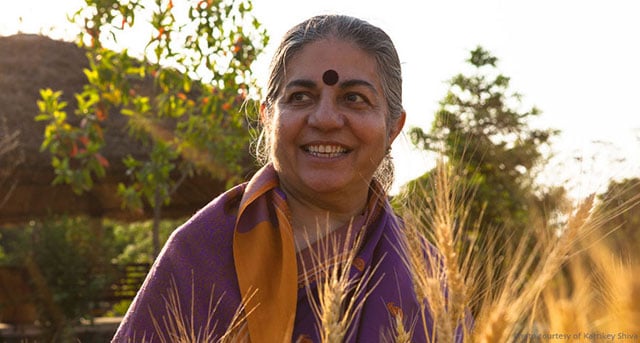
The following is a Truthout interview with Vandana Shiva.
Mark Karlin: Your anthology focuses on women writers who “are in the vanguard of the fight against GMOs and corporate agriculture.” Why are women so important in showing “the way to have both bread and freedom”?
Vandana Shiva: The anthology has contributions from women seed savers, organic farmers, women scientists and mothers. Women have historically been the seed experts across societies. Even today, women are leading the movement for seed saving as the contributions in the volume show. Women scientists who have contributed to the volume are independent and courageous. They are not locked into the clubs of corporate science. And mothers are the ones who have to take care of their children when they fall ill because of chemicals and GMOs in food.
What is the relationship between the industrial paradigm of agriculture and the war industry?
Industrial agriculture is a product of war, both at the paradigmatic level, and at the level of instruments, tools and technologies. The synthetic nitrogen fertilizers were made in the same factories that made explosives. That is why fertilizer bombs are often used in terrorist attacks. The precursors of pesticides were the poison gases used in the war and nerve gases used in gas chambers.
Agent Orange was a herbicide that was used in the Vietnam war. In terms of a paradigm, industrial agriculture is based on the war mentality that the “other” is an enemy that should be exterminated. It could be the biodiversity exterminated as weeds by herbicides, or pollinators and friendly insects exterminated by pesticides and pesticide-producing GMOs.
What is the so-called “Green Revolution” and how does it relate to cancer?
The so-called Green Revolution is neither “green,” nor “revolutionary.” It was the name given to chemical industrial agriculture when it was imposed on the Third World. The Green Revolution was first introduced in the fertile and prosperous land of Punjab in 1965. It promoted monocultures of rice and wheat varieties bred for taking up more chemicals. The monocultures and chemical varieties were vulnerable to pests. This led to increased use of pesticides. The pesticides have led to a cancer epidemic in Punjab. Today, there is a train that leaves from Punjab to Bikaner, where there is a charitable cancer hospital — a train referred to as the “cancer train”
How does agro-biodiversity bolster food security?
Agro-biodiversity bolsters food security at many levels. Firstly, the more diversity of crops we grow, the more nutrition we produce. When we measure nutrition per acre, not yield per acre, biodiversity produces much more food, and food rich in diverse nutrients, micronutrients and trace elements.
Agro-biodiversity also contributes to ecological functions of pest control, weed control, water conservation and soil conservation. It rejuvenates soils. Soils in bio-diverse agro-ecosystems are rich in organic matter, which increases soil fertility and water retention, thus increasing food security.
 Vandana Shiva. (Image: North Atlantic Books)
Vandana Shiva. (Image: North Atlantic Books)
How does corporate-chemical agriculture contribute to global warming?
Fifty percent of all greenhouse gases are contributed by corporate-industrial chemical agriculture and globalized trade. The chemical system is in fact a fossil agriculture, since it is dependent of fossil fuels. Nitrogen fertilizers, which are produced from fossil fuels, emit nitrogen oxide, which is 300 times more damaging to the atmosphere than carbon dioxide. Chemical industrial agriculture increase mechanization and use of fossil fuels. Long distance transport adds “food miles” and carbon emissions. The destruction of diversity and increasing dependence on a few globally traded commodities has led to deforestation in Brazil, Argentina, Indonesia. Deforestation related to agriculture contributes to 15 percent of the GHGs.
Why is corporate propaganda that chemicals and seed engineering reduce hunger wrong?
Corporate propaganda that chemicals and GMOs reduce hunger is wrong because chemicals promote nutritionally empty monoculture commodities , which create a hidden hunger of nutritional deficiencies. It is wrong because high cost inputs make farmers indebted, and farmers in debt are hungry farmers. Of the 1 billion hungry, 500 million are farmers.
It is also wrong because GMOs do not increase yields. The yields come from the original crop into which the introduced genes are added through genetic engineering.
Finally, it is wrong because this model produced commodities, not food. The largest expansion in GMOs has been in corn and soya. Most of the corn and soya goes for biofuel and animal feed. Only 10 percent goes to food. Commodities feed profits of corporations, not people.
Join us in defending the truth before it’s too late
The future of independent journalism is uncertain, and the consequences of losing it are too grave to ignore. To ensure Truthout remains safe, strong, and free, we need to raise $27,000 in the next 24 hours. Every dollar raised goes directly toward the costs of producing news you can trust.
Please give what you can — because by supporting us with a tax-deductible donation, you’re not just preserving a source of news, you’re helping to safeguard what’s left of our democracy.